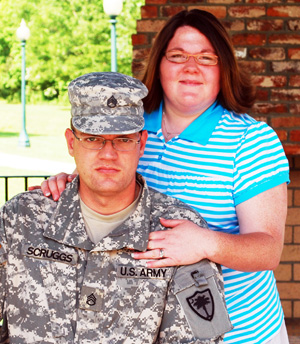
Matthew Scruggs is a Lander University student and a S.C. Army National Guardsman. He is also among the estimated 20 percent of American veterans of combat in Iraq and Afghanistan who struggle each day with the symptoms of post-traumatic stress disorder (PTSD). But Scruggs, who has served two tours in Iraq, is determined to do what he must to keep the condition under control while he concentrates on his responsibilities as a husband, a full-time student in Lander's William Preston Turner Department of Nursing, a caregiver and a soldier.
Scruggs displayed symptoms associated with PTSD when he came home on leave in February of this year. That was near the end of his second deployment to Iraq where his job was convoy security, blocking electronic signals that could trigger IEDs, improvised explosive devices. His tour ended in late April and, when he returned home, his symptoms had worsened. Two months later, military doctors diagnosed the nightmares, severe anxiety and distress he was experiencing as signs of PTSD.
Since then he has been an outpatient at the Veterans Affairs Medical Center in Columbia where doctors prescribed medication to stabilize his condition. He also consults with VA mental health professionals on a regular basis. "My ability to cope and my quality of life depend on it," he said.
He and his wife of three years, Ashley, have faced marital difficulties caused by the stress of his wartime experiences, but they are working together to overcome them. Said Scruggs, "We have relied on our strong Christian faith."
He does not complain about the PTSD problems he experiences. "I did my job and came home. The heroes are the ones who lost their lives or suffered crippling physical and psychological wounds."
Scruggs actively supports the Wounded Warriors Project, a volunteer organization founded by veterans whose mission is to help wounded American servicemen and women and their families. "It is a very important program, very much needed," he said, pointing out that he can identify with the slogan, "Not all wounds are visible."
Scruggs, 34, is a big man at 6 feet 6 inches tall and 270 pounds. He enlisted in the Army in 1994 after graduating from high school and served two years on active duty. In 2004, he joined the National Guard and planned to serve only one year. Now, six years later, he is a staff sergeant with the 1055th Transportation Company in Laurens.
During his first deployment overseas, Scruggs and his father, Sergeant First Class Frederick Scruggs, were sent to Iraq together as members of the S.C. Army National Guard's 111th Signal Battalion in Hodges. Later, the elder Scruggs would serve for a year in Afghanistan, returning home on Nov. 14. He and his wife, Cheryl, live in Hodges.
Father and son and three other members of their family are in the military. Scruggs' brother Daniel is on active duty with the Army in Florida; his sister, Rebecca, is a member of the S.C. Army National Guard; and brother-in-law Michael Porter is a staff sergeant in the Army National Guard unit in Newberry.
Scruggs has earned a chestful of decorations for his military service. They include the Iraq Campaign Medal with two stars; two Army Commendation medals; National Defense Service Medal; two Overseas Service ribbons; a Global War on Terror Service Medal; an Army Service Ribbon and a Good Conduct Medal.
So far in his career, the military has not taken advantage of Scruggs' experience in nursing. He has worked as a nurse at the Patrick B. Harris Hospital in Anderson and now holds part-time positions at a nursing home in Abbeville and at Greenwood Regional Rehabilitation Hospital.
In September, he enrolled in Lander's RN to BSN completion option, an online program that enables registered nurses to obtain four-year nursing degrees. He is a junior and expects to graduate in December of 2011, after which he will be eligible to be commissioned as an officer. He also plans to remain in the military and continue his studies for a master's degree in nursing.
But for the present, Scruggs is focused on controlling his post-traumatic stress symptoms and not allowing them to control him or disrupt his life.